Taking beef jerky sales to the stratosphere
An online retailer who supplies astronauts with dried beef needs a new strategy to propel his earthly revenues.
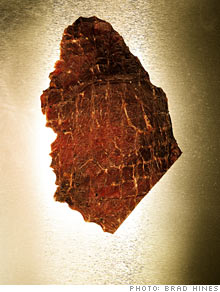
 |
| Home cooking: Nemitz at the Monrovia, Calif., factory that makes the jerky he sells online |
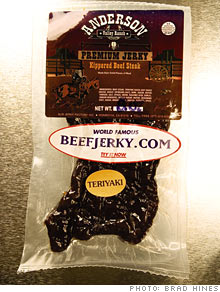
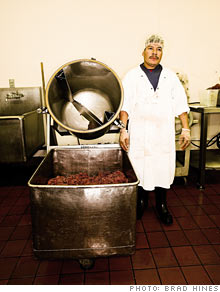 |
| Mixin' fixin's: A factory worker blends meat with spices. |
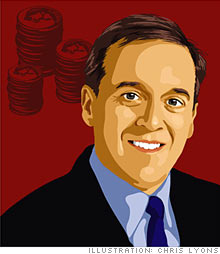 |
| Gregory Hess is an economist and faculty dean at Claremont College in Claremont, Calif. |
 |
| Joyce Mallonee is president of Food Strategies in Lafayette, Calif. |
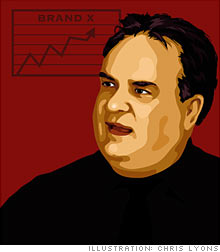 |
| Bob Hughes is owner of Hughes Marketing in Glendale, Calif. |
MONROVIA, CALIF. (FORTUNE Small Business) -- If Gregory Nemitz tells you his beef jerky is out of this world, believe him. His jerky has traveled to space stations four times for astronauts who crave the stuff. If only he could get revenues for his Web-based company, Beefjerky.com, off the ground as well.
Back in the mid-'90s, Nemitz worked as an engineering technician for a San Diego firm hired by NASA to build prototypes of rovers destined for Mars. A longtime beef jerky enthusiast, he was also busy whipping up batches of the snack from his own recipe for appreciative friends.
On a whim Nemitz tracked down the food manager for NASA's shuttle program and sent her jerky samples for the crew to try. His product was a hit - several astronauts took it on trips to outer space or had it sent to them while they were living on the space station. Now, with a tip of the hat to Star Trek, Nemitz calls that variety, which is black pepper flavored, "Final Frontier Jerky". On his website Nemitz also sells three other types, which bear the brand names of the company he uses to manufacture his jerky, Anderson Valley Ranch.
Nemitz registered the name Beefjerky.com in 1995. When the rover work dried up two years later, he devoted more time to selling jerky on the Web. At one point, eager to learn more about the industry, he took a job selling jerky roadside on the weekends. Now he works from his Twin Falls, Idaho, home, processing orders and shipping all four jerky varieties worldwide.
But Nemitz, 50, is frustrated. Jerky is an impulse buy - most shoppers grab some when they spot it by the convenience store cash register. Few of its devotees get a spontaneous hankering for jerky at home and order it online.
After more than a decade in business, Beefjerky.com posted revenue of only about $150,000 in 2007, and Nemitz netted around $50,000. Though Beefjerky.com pops up at the top of Web searches for jerky, Nemitz ships only eight or nine orders a day, at about $50 an order.
"I should be selling ten times as much," he complains. So he contacted FSB and asked for a makeover to help him boost sales - if not into space, at least a few miles higher.
The first expert we sent to Nemitz is Joyce Mallonee, president of Mallonee & Associates, a Lafayette, Calif., firm that specializes in branding and marketing specialty foods. She arrives at Anderson Valley Ranch's factory in Monrovia, Calif.-about 20 miles northeast of Los Angeles - ready to help Nemitz decide whether to sell his jerky in retail stores, where shoppers can find his bigger competitors, such as Oberto and Jack Link's.
Mallonee starts with a quick tour of the jerky factory, a one-story yellow cinder-block building. Workers wearing hairnets and white lab coats are busy laying marinated beef slabs on metal racks. Later, six to eight hours in the oven will transform the strips into jerky. The factory has no seating, so Mallonee, 57, holds court at a nearby restaurant. "Tell me about your product," she begins.
Nemitz explains that his jerky is fresher than most: "The jerky I ship is only about two weeks old and has a sell-by date six months from production. Some other brands have expiration dates that keep them on store shelves for two years."
Beefjerky.com's offerings contain little or no sugar, have almost no preservatives, are 96% fat-free - and some deliver a whopping 17 grams of protein per ounce.
"Wow," says Mallonee. "You could position this as a very healthy food for people who aren't affected by all the salt. Having the word 'California' on the label is a big plus. It suggests fresh and natural."
But if Nemitz wants to sell his jerky in stores, Mallonee tells him, he has to upgrade his packaging and sell a single brand - his own.
"This won't work," she says, holding up an eight-ounce bag she ordered from his website. "It's a shrink-wrap bag with a label stuck on it. If you want to look upscale and California, keep the shrink-wrap, but put it in a rustic-looking brown paper bag with two-color labels. That shouts 'natural.'"
Mallonee tells Nemitz that he should label all the products he sells. "You can't sell a bunch of different brands - it's just too confusing," she says. "You want to establish customer loyalty, not look like a clearinghouse for jerky."
Nemitz also has to win over store owners. But if he sells the exact same thing on his website and in stores, retailers will view him as competition, notes Mallonee.
"Offer stores two-ounce packages instead of the eight-ounce options you sell online," she suggests.
To get his jerky into big retail chains, Mallonee says Nemitz should start by visiting individual stores and discussing with managers his products' selling points and possible placement ideas. Nemitz can reach standalone specialty-food stores by sending samples and press releases to Gourmet News, a magazine that keeps food boutiques informed about new products. And, adds Mallonee, he should consider investing $10,000 in a booth at the annual Fancy Food Show in New York City.
The next day Bob Hughes, owner of Hughes Marketing, a Glendale, Calif., direct-sales company, arrives.
Hughes tours the factory before he and Nemitz head to a coffee shop a few blocks away. Nemitz tells Hughes he's frustrated that barely one Beefjerky.com visitor in 100 ends up buying anything. He wonders whether direct marketing might boost sales.
Hughes, 54, frowns. "The market is just too broad," he says. "You could never afford it." Instead, Hughes shifts the focus to Nemitz's existing customers.
Nemitz estimates that Beefjerky.com has had a total of about 4,500 unique visitors. Hughes encourages him to focus on them.
"Even if they haven't ordered from you lately, they know you, and I assume they've had a good experience with you," Hughes says. Offer them a better deal than they're getting now, he urges: "People want to feel they're getting a bargain. Raise prices, and then offer discounts. Send previous customers e-mails explaining that your premium jerky is being offered - for a limited time - at the price of the competitors' ordinary jerky. Make it seem urgent to act immediately. It's a classic approach, but it works!"
Given his experience with discounts, Nemitz is dubious.
"Customers got annoyed when the special prices ended, and some stopped buying completely," he says.
Hughes offers a solution. "Have them answer a few questions in order to get the discount. Ask who they are demographically, why they buy, and for whom. You'll get vital information, and customers won't be mad when the promotion ends."
To put former customers in the habit of ordering jerky online, he continues, why not create a jerky club, where monthly clients get a deal? Have special prices for first-time buyers, and offer them a sampler of different flavors - if they don't like one, they might get hooked on another. By including fliers with special offers in every order he ships, Nemitz could generate repeat business.
"Don't give anything away," Hughes reminds him. "Raise prices so you can lower them." Nemitz tells Hughes that some of his biggest fans are troops posted overseas, without easy access to jerky.
"Create a gift page on your website," Hughes suggests. "It would allow soldiers' families and friends to ship jerky to them monthly."
Hughes also urges Nemitz to spruce up his website.
"It's dull, flat, matter-of-fact," he says. "Tell people who you are, how much you love jerky, and how devoted you are to finding and creating the world's best."
Disagreeing with Mallonee, who urged Nemitz to focus on his own brand, Hughes says the site should clearly establish that Beefjerky.com is a cost-effective Web source for many jerky brands and flavors, and each is an exceptional value.
"Stress that you've searched the market and found the best combination of flavor and value for every type of jerky you carry," he advises. Nemitz should then promote each brand in ways that set it apart. "Start by identifying your Final Frontier variety as the jerky chosen by NASA to accompany astronauts into space," says Hughes.
After Hughes takes off, Nemitz heads to Claremont McKenna College in nearby Claremont, Calif., to meet with professor Gregory Hess, an economist and dean of the faculty. Nemitz is pleased to find Hess bursting with marketing ideas.
"There's nothing more American than beef jerky," says Hess. "Why not have a jerky-eating contest on July 4?" Nemitz could consider a beer company as a co-sponsor. "Call Budweiser (BUD, Fortune 500) and have them join in," suggests Hess. If a national contest seems out of reach, Nemitz could put on regional ones at state fairs around the country, perhaps teaming up with local breweries.
Hess, 45, is on a roll and having fun. "Have a jerky-recipe contest or offer exotic variations of jerky."
Nemitz points out that turkey, ham, ostrich, and even giant clams can be jerked. "Have turkey jerky for Thanksgiving and ham jerky for Easter," suggests Hess.
While trying to come up with a product to co-market with jerky, Hess closes his eyes and mutters, "Jerky, jerky, jerky. What rhymes with jerky?" Abandoning that tack, Hess suggests an online poll that asks customers what beverage goes best with jerky. He wonders whether an energy drink might be a good match. "You could put cans in boxes of jerky, and add a link to the drink company's website." And so it goes, until Hess announces his time is up. Nemitz, grinning, shakes his hand, thanks him, and departs.
What's next for Nemitz? "I don't want Beefjerky.com to become the Amazon.com (AMZN, Fortune 500) of the jerky world - other sites already fill that niche," he notes. "Joyce is right. To go retail in a big way, I'll need a single, unifying brand."
Nemitz hopes to rename the Anderson Valley Ranch flavors and develop his own brand. And he is eager to meet with retailers and food brokers to try to get his jerky in stores. He's also excited about a possible deal to sell his Final Frontier flavor at Yellowstone National Park's general stores starting this summer. He plans to resume negotiations with the park's buyer this spring.
Nemitz believes aggressive marketing to past customers will be his most efficient game plan. He's considering e-mailing a monthly newsletter with recipes, nutritional advice, and special deals. And he plans to look into the option of trademarking a jerky-eating contest so that rivals don't do it first.
"The main thing is to get people to taste my jerky and hold a package with my Web address in their hands," he says. "Once they do, I think I can keep them coming back." ![]()
Could your small business use a makeover? Visit our Makeover page and submit it.
How do we reach our target market?
Building to a million-dollar business
Navigating the flooded bottled-water market
-
The Cheesecake Factory created smaller portions to survive the downturn. Play
-
A breeder of award-winning marijuana seeds is following the money and heading to the U.S. More
-
Most small businesses die within five years, but Amish businesses have a survival rate north of 90%. More
-
The 10 most popular franchise brands over the past decade -- and their failure rates. More
-
These firms are the last left in America making iconic products now in their twilight. More








